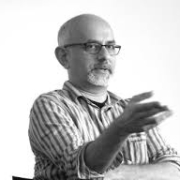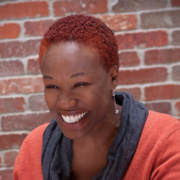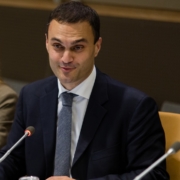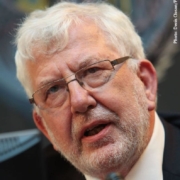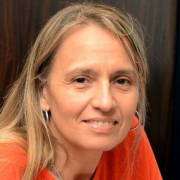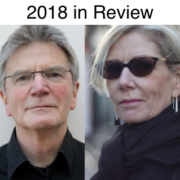Christina Kwauk & Radhika Iyengar
Climate Education beyond COP26
Today we take stock of climate education, its past and its future. With me are Christina Kwauk and Radhika Iyengar, who have recently co-edited the book, Curriculum and Learning for Climate Action: Toward an SDG 4.7 Roadmap for Systems Change. They argue that COP26 has been disappointing in terms of education and climate action, and encourage everyone to focus on local action and change.
Christina Kwauk is the Research Director at Unbounded Associates and a non-resident fellow at the Brookings Institute. Radhika Iyengar is Director of Education at the Center for Sustainable Development, Earth Institute, Columbia University.
Citation: Kwauk, Christina, and Iyengar, Radhika interview with Will Brehm, FreshEd, 262, podcast audio, November 15, 2021. https://freshedpodcast.com/kwauk-iyengar/
Will Brehm 1:43
Christina Kwauk and Radhika Iyengar, welcome to FreshEd.
Christina Kwauk 1:46
Thanks so much for having us today, Will.
Radhika Iyengar 1:48
Thank you, Will, for having us here. A pleasure to be here.
Will Brehm 1:50
Congratulations on your new co-edited volume or book. It’s really wonderful, quite large, a lot of contributors, a lot to talk about. In the edited collection, you argue that a radical transformation of our education systems is needed to catalyze the scope and scale of mindset change, paradigm shifts, and worldview expansion to address the climate crisis. That’s a quote from the book. Give us a sense of what that actually looks like.
Christina Kwauk 2:20
So, thanks, Will, for that question. I think where we are coming from with that particular statement is that the education system has been quite complicit in perpetuating the kinds of values that enable not only the destruction of the planet, but also deeply embedded social inequities between and across different people. And so, when we say we want to see the education system begin to radically reorient its very purpose, the purpose of education, I think what we want to see is that education is not just about teaching knowledge, facts, but that it is about reshaping how we view ourselves in the world and with each other. And this makes education -I mean, it goes back to the very political nature of education, and how we have to recognize that we are being taught to be social beings, citizens of the world, citizens of the planet. And if we are not allowed the opportunity to explore those relationships, those systems, or the histories, we cut ourselves short from being able to really transform society.
Radhika Iyengar 3:40
I just want to add to what Christina just said but also, keeping the conversation very realistic, and very frank. We’ve been talking of this transformative education, radical education for a very long time. And what have we seen so far? It’s not just a jargon, this is really the time. So, our book actually describes how this transformative process takes place through the various roadmaps that we discuss. So, it’s not just giving a framework of this transformative education, giving what this radical education really looks like in a theoretical form. We actually give insights from schools, from youth, from community members, and that’s how it all started. Our book came about after our online discussion with around 400 community members who came together at Comparative and International Education Society (CIES) 2020. When Christina and I did this workshop, we thought our job would be over in one hour, but we continued for four hours because there were so many different voices that were there telling us their stories. And they were not education voices. So, as Christina is saying, this transformative education, radical education, it needs to be the core of where we want to get at. But the voices are not education voices. So, if you see in our book, they are not education specialists, or experts or education professors, they are people from all different scapes, all different parts. Actually, our youngest author, this was last year, he was in grade seven. So, you can imagine that we are bringing in all different stakeholders to talk about this transformation of what it means to them. And transforming UNESCO’s ESD framework and their futuristic framework to allow for this transformation to actually take place in communities and in different parts of the world, giving different examples from different countries to show what does it really mean? It’s not a jargon, or it’s not just a word that just is thrown out. We, Christina and I, really got lucky to get all these insights from all these authors who are actually describing transformation in implementation. So, which is the key for our book.
Will Brehm 6:03
Why is it so important to focus on systems when thinking about this radical transformation rather than say, individuals?
Christina Kwauk 6:13
The climate crisis is a systems failure, it reflects a systems failure. It’s not an individual that has caused emissions. It is a system that enables certain types of production, certain types of consumption, certain kinds of values to be perpetuated. And as a result, changing or addressing that climate crisis requires a systems approach. It’s not changing individual behavior alone but it’s changing the food systems, our transportation systems, our energy systems, which include individuals but how our individuals are structured together as different components of society. And so, if we aren’t thinking about our education in the same way -if we’re thinking about education as merely a project of informing and inculcating in the individual certain knowledge, skills, and attitudes to become great workers in the workforce, and not thinking about how that individual is connected to the very systems that drive our current ecological crisis, then we can’t leverage -or then we just perpetuate that education is just being about knowledge. Not being about relationships, not being about addressing systems of power. It shortcuts our whole educational endeavor.
Will Brehm 7:26
One of the things that fascinates me is that the United Nations had this thing called “The Decade of Education for Sustainable Development” (ESD Decade) between 2005 and 2014, which presumably would try to work towards some of this radical transformation. Did it work? I mean, with 10 years of sustained effort and focus on education for sustainable development, did the UN accomplish anything, in a sense, towards that goal of radical transformation that you’re talking about?
Radhika Iyengar 7:56
So, with ESD Decade, what we agreed on was that we didn’t agree on one common definition of what ESD means. And there was this whole confusion between transforming environmental education, climate education, ESD. All sorts of definitions going around. And there were some people who were saying, “No, this is marginalization, or this is agenda setting, and we are not looking at all the other…”. So, I think we were in debate on the definition of ESD. For a long time in education, we are famous for delaying things, just deliberation, and all sorts of processes that need to take place. But also, we were also in discussion in terms of the pillars of sustainable development. Whether we have three pillars, whether we are four pillars, should we add on accountability and governance as one of the pillars. So, that continued for some time. Just some kind of existential crisis. But at the same time, I think three things that come to mind, in terms of its ESD Decades accomplishment, is this idea that climate education needs to be, or ESD, needs to be integrated into science. I think that happened quite forcibly. There were a lot of science-related, sustainability-related language, at least it got integrated into the science component. There was a focus on collaboration. That the education sector is not doing this alone. It has to work with different sectors, environment, and at the local level, work on collaborations and other things. So, I think that really pushed the agenda now. And then also it set the stage for SDG 4.7. So, a lot of deliberation had already happened. And I thought that provided the homework for when SDGs were decided -and for SDG 4.7 and its definition and its overall work. But of course, there’s much to be accomplished. There’s a lot to be done.
Will Brehm 9:42
SDG 4.7, like when that was adopted in the Sustainable Development Goals, was that a sign of the international community taking issues of climate education, education for sustainable development serious? How did you perceive that moment when that happened in 2015?
Christina Kwauk 10:00
I think we’d like to describe SDG 4.7 as sort of the kitchen sink, right? It’s everything that we couldn’t fit into a specific goal just sort of all clumped together. And I think that that also is a reflection of, kind of, the seriousness, or perhaps the lack of seriousness, around those particular issues. Because I think if we were really serious about those topics -gender equality, sustainable development, human rights, and so on- if we were really serious about that, I think we would have embedded those throughout every single aspect of SDG 4, of every aspect of the SDGs. And not just a singular subcomponent. And I mean, climate change at the target level, not even referenced. I think that that sort of speaks to where the global community was at that point in time. And I think it just reflects sort of the emphasis within the education sector on a very narrow set of goals.
Will Brehm 10:54
I think you’re right. It is sort of like the kitchen sink. Everything is in SDG 4.7. And on the one hand, it is quite amazing to see the global community sort of agree on these huge ideas that are all lumped together, which maybe was a diplomatic reason, or who knows why it ended up happening that way. But could you talk a little bit about the measurement of that target? Like, how is SDG 4.7 even measured? How do we know -or how does the international community know when it has achieved SDG 4.7?
Radhika Iyengar 11:26
I have a very disappointing answer, Will. We will not know whether we will achieve SDG 4.7, in which country because I think a lot of SDG 4.7, to me -the language itself- is a mix of poetry and mathematics. Because we have this beautiful language around all the things that we need to accomplish, and then there are some indicators. And just to give you some local examples that are missing, which I feel is really a flaw of nationally aggregated datasets, which we will not be able to get to see where actually SDG 4.7 progresses. For example, in districts in India, students do these plantation drives clearly related to climate change, clearly related to SDG 4.7. These indicators are only at the district level, and at the national level it’s just a number that is not even reported for SDG 4.7. Another example is that India with the Greta movement, there’s a lot of blogging, marches where a lot of youth are there picking up plastic bags, there are a lot of drives on plastic. But at the national level, there is no aggregation to this. So, I see a lot of local activism, a lot of district level work happening at the district offices, planting millions of trees but those indicators that are locally relevant, and may or may not be even nationally relevant. There is no report going to the UN saying that “We did this. This is how we measure SDG 4.7”. Christina can correct me here as she’s done extensive work on measuring SDG 4.7. I’ll let her speak further. But I just wanted to add that, I think in a way, it is good that we don’t have global metrics that measure SDG 4.7. But at the same time, the countries needed to adopt, or adapt, or develop their own locally relevant SDG 4.7 metrics, which I don’t see happening. And there are many other activities in place that are not being measured. So, I don’t think we will ever be able to know, what is the actual progress of SDG 4.7, and what does it mean, to accomplish this in each country-context?
Christina Kwauk 13:39
Yeah, I think the challenge is that the current way that SDG 4.7 is set up to be measured is that it’s really focused on the extent of integration within curriculum -national policies, teacher training, that sort of thing- and that, as Radhika mentioned, is an extremely low bar for understanding what the level of progress is. There’s no indication as to whether or not knowledge transfers into action, and what kind of action that might look like depending on context based on certain kinds of challenges that communities are facing. And so, it becomes really difficult when you’re thinking about creating a global indicator of what progress looks like, because it is, as the climate crisis indicates, so contextually specific. And so, without some kind of locally specific or context specific indication of progress, it’ll be very difficult to understand how efforts are actually changing the status quo.
Will Brehm 14:36
That seems like a real tension in terms of measurement, of trying to measure some sort of global target that is shared by all countries and all communities. And then, as you’re saying, that there’s so many local variations of what communities are actually doing that are connected to this global goal. I mean, that tension in measurement, is that ever going to be resolved or is that something we shouldn’t even be trying to do. I sort of feel sorry for UNESCO Institute of Statistics. This seems like an impossible endeavor?
Christina Kwauk 15:07
Well, I think we just have to be very honest about what those indicators are measuring. You know, just recent, even worked with Education International to develop a climate change education ambition report card. And so, it was very, very clear that the intention of these indicators that we developed was focused on the ambition within policy, and that, in no way does that have an indication as to the implementation or the effectiveness of that climate change education. And so, I think, maybe that’s where we have to go with our global monitoring and accountability mechanisms, is, what are we attempting to measure? Because definition is an issue still, understanding the context specificity is also an issue when it comes to measurement. Perhaps one of the conversations we need to have is, maybe it’s the ambition that we’re trying to measure. And then local contexts, through their more regional measurements of progress, understand more the kinds of data that can be collected and measured for benchmarking and measuring progress.
Radhika Iyengar 16:10
I just want to add here that one is global and international measurement. And the other is state level measurement. We don’t even -so, I live in two states. One is in New Jersey, in the United States, and the other one is in Madhya Pradesh, in India, those are my two countries. And I feel that to make these SDGs locally relevant, the states need to have their own indicators, so that we can say, “Okay, this is my state. This is where we are heading towards air pollution. This is what my metrics is”. So, I believe that for the United States, there’s a new indicator report, which SDNS releases every year. This year, the report will be released on the 17th of November, to know about your own state’s SDG indicators. To me, I think that is much more relevant because then I can go to my congressman, my township members, and I can say what are we doing for pollution? What are we doing for education? And again, describing and adapting the global frameworks to the state level, I think might be a much more useful action-oriented item than at the end of five years, one country says we have been able to accomplish SDGs and you have all not accomplished SDGs, but the community is left out. So, action-driven indicators at the sub-national level, or even below that, if it is possible by collective action or by state level drives probably will be a much more useful way of contextualizing SDGs and making it more useful in terms of action.
Will Brehm 17:47
You know, I understand, and I really do appreciate the focus on that local level and the community level, and having accountability structures set up to hold local elected officials accountable for specific targets related to broadly speaking, SDG 4.7. But at the same time, it is probably valuable to think about the role of the state and the way in which states are being held accountable. And so, it just sort of begs the question in my mind about, do we know anything about how nation states perceive education for sustainable development? Like how are nation states or countries even beginning to think about that idea itself? Is there any research on that?
Radhika Iyengar 18:30
Not sure about research but I think the 26th UN Climate Change Conference of the Parties (COP) 26 has shown that SDG 4.7, at least in terms of the basic things that need to be done -climate education integrated into core curriculum, focus on values and attitudes and knowledge- about ESD, those things are coming up more and more as compared to previous years. So, at least there is a positive sign that basic things are being covered with the COP 26 language, though I am yet to see exact language on sustainable development goals or SDG 4.7. It’s definitely climate-related activities are integrated into the core curriculum, which is a great start in terms of the process that needs to be followed.
Will Brehm 19:14
And is that different from previous ways of understanding climate education? Like, so seeing climate education as, sort of, integral to all of the core curriculum rather than say, just in the sciences or in a particular subject? I mean, is that fundamentally different in your opinion?
Christina Kwauk 19:30
Yeah, I think that there has been a sea change when it comes to thinking about how climate education should be implemented. I think perhaps as a legacy of, sort of, the ESD movements and kind of it being concentrated within the sciences when implemented that that sort of has translated into how we consider climate education. But I feel like there has certainly, within the last two years at least, due to a lot of global advocacy by different organizations to really begin to say “No, if it was just about the facts, we would have solved the climate crisis decades ago. It’s not just about the facts. It’s not just the science. It has to be integrated across the entire curriculum, across the whole school”, right. As a sort of an organizing principle for school operations and management, and so on. So, I think that there’s certainly been quite a shift in the demand around how climate education should be implemented. And I think in many ways, climate education has usurped, sort of, ESD as the global focus and I think to the efforts of those that have been really trying to push awareness around the climate crisis and the urgency of addressing climate change in particular. But to kind of go back to what Radhika was saying, as well, you know, what I have noticed with COP is that, if we are talking about in the spirit of SDG 4.7, and how that’s been taken up by conversations within the education discussions at COP. I think we see the spirit of SDG 4.7 as fragmented as the target itself is.
Some parties at COP are all about inclusion of gender equality language, gender issues, in their policy discussions and the negotiations but human rights have been struck out. And this is something because not all parties are going to agree on a human rights-based approach to education, or public participation, or whatever it might be that they’re discussing within the COP negotiation rooms. So, in some ways, it’s great that we have SDG 4.7 because it ensures that those topics are included, or at least give advocates a space to say, “Hey, these are mentioned as global goals, let’s make sure we’re talking about it”. If they weren’t there, we would have no leverage point, right? So, in many ways, it’s great that we have that framework to say, all right, ACE negotiations, the Action for Climate Empowerment negotiations, we want to see gender issues, we want to see human rights, we want to see citizenship, we want to see civic engagement. We want to see all these different dimensions and that provides at least some impetus for making the demands. And then it also shows that there’s great discord when it comes to all parties agreeing to these different components. So, it certainly highlights the political dimension of these topic areas.
Will Brehm 20:02
It is interesting to think that, you know, SDG 4.7, because it includes so many diverse topics, like you said, human rights, and gender equality and education for sustainable development, and global citizenship education. All these big, different topics that probably deserve their own separate targets in and of themselves, but you could almost see how diplomatically, if you put them all together, you probably can get enough people to agree on that broad topic. But then in the implementation of it, states can sort of pick and choose which ones of those, you know, laundry lists that they actually want to support, and then sort of push to the side any of the other big topics that they, for whatever national reason, do not feel comfortable and willing to address. I mean, it’s like a double-edged sword in a way.
Christina Kwauk 23:15
That’s true but I think an absence of inclusion would really prevent us from being able to really demand the attention to those, right? I mean, in our book, we have a section that is focused on monitoring and accountability mechanisms. And in that section, it’s mostly voices of young people, of students, sort of calling out like, “Here is what our education looks like. And if we are not really making true to SDG 4.7, that calls on these components to be included, how are we gonna make progress on these issues”? But the fact that they’re there allows us to say, “Governments, you need to be accountable for these dimensions”. So, I think you’re right, it’s a double-edged sword but it allows for the discourse, and allows for the activism to come in.
Will Brehm 24:04
And so, thinking about COP 26, that’s taking place in Glasgow, we’re speaking on Wednesday, November 10. So, it’s been about a week and a half of activities in Glasgow, it ends on Friday. So, when listeners listen to this podcast, COP 26 will already have been over but given that sort of context, has the activism and has the conversation of education for sustainable development, climate change education, what have countries and states actually agreed to? Has it been meaningful?
Radhika Iyengar 24:36
I think that COP 26 just covers the basic essentials, and it is running a couple of generations behind. Here we are, in our book, talking about inclusion, democratization. This whole book is a process of democratization where we are bringing in so many different voices. And what did we see at COP? That all the ‘Gretas’ of the world and all the activists were outside and they were not even able to come inside. So, are we actually giving them a voice? Or are we saying that “Okay, you are here just to listen to what we decide on”. So, COP 26 gave us a sense of how the education system is currently working. We don’t give space for students in our class to actively listen, engage, make those decisions on their own. And we have chapters in our book, where teachers are saying, “Let’s empower the students, let’s not just be a slave of the curriculum and the examination system that we currently have”. COP is a replication of what we do in our classrooms. So, I think this whole idea of bringing in different voices, making sure that there is disruption, making sure that we address climate crisis -there was this poster that I saw one of the protesters holding at COP on Twitter, which said that if we talk of environment activism, or environment action without focusing on climate crisis, or without focusing on justice issues, it’s like doing gardening. So, in the class also, we are doing the same. They’re tweaking the curriculum, we are adding this, there, that, there without getting at the crux of why are we in this position? What is happening in the world around us? What are the inequalities? What are the social justice issues? What is the transformative education that we want to bring in? COP 26 agenda, so far, has not brought in any kind of transformative education. So, I hope they’ll read our book, the leaders read our book, and understand what is meant by transformative education and how these different voices from our book give a sense of how do we actually implement it in reality.
Christina Kwauk 26:42
I certainly think and I think activists and folks who are in Glasgow right now are certainly making it well known that this has been quite an exclusive COP. And that, you know, the voices of key stakeholders have not been allowed into the actual negotiation spaces and into key decision-making spaces as well. I want to give two examples of things that are coming out of COP that I think give an indication of where we are right now when it comes to climate education and, kind of, the gap that we still need to fill. So, on Friday, the 5th of November, there was a ministerial event that brought together education ministers and environmental ministers together to make statements about the importance of climate action and climate empowerment and education and so on. And shortly after that, the co-chairs released a statement, kind of, a conclusion statement from the event. And I think on the one hand, the fact that there is a joint statement on this topic of climate education is a huge sign of progress. This is, you know, unprecedented that there’s actually this level of discussion on education at this event. But where it fell short is that -it goes back to kind of the roadblocks that we were talking about in our book- the vision for that is so lackluster. There is nothing radical about it. It’s about including climate change into the curriculum, yes. But there’s nothing about climate justice, looking at the systemic issues, looking at social inequities, looking at unequal dynamics of power, you know, present relations of carbon colonialism. Like there’s nothing systematically radical about it, right? It risks just perpetuating the status quo but satisfying student demand to have more climate education in the classroom. Okay, so that’s one example.
The second example is that on the same day, the UK’s United Kingdom Secretary of Education announced their draft sustainability and climate strategy for their education systems. And I took a quick glance through that, read kind of what the key points are, what they’re calling for. And I was so disappointed to read a section in there that essentially said, we just want the facts please. We cannot have teachers inculcating students, radicalizing students around political agendas. And that to me, just is an indication of the uphill battle we still have to fight here. Because I mean, yes, include climate change in the curriculum. Yes, that’s the bare minimum. As Radhika just said, it’s the bare minimum that we should see. But if we really want to see the transformative potential of education, we have to get at the systemic issues that are driving the climate crisis, which means we have to bring those issues into the classroom. It is a political endeavor. And just seeing these two paragraphs elaborating on why teachers should leave their politics at the door, and not discuss political issues, and not engage in the critical discussions and enable that civic awareness to be built. I feel like it’s again, kind of, just teasing us and saying, “Yeah, we’ll give you the climate education, but we’re not going to change the status quo. We’re not going to achieve systems change. We’re not going to achieve just transitions because we’re really just talking about achieving a little bit”.
Will Brehm 30:19
That’s rather depressing, isn’t it? I mean, is it too late? I mean, like, if that’s where we are with COP 26, where on the one hand, a book like yours is pointing to totally different radical transformation of education and showing how it’s possible. But then on the other hand, we have this massive international climate conference, and you’re saying it’s baby steps. So, where does that leave us for the future?
Radhika Iyengar 30:48
Future is local, Will. I think we need to have more COP 26 in every county and bring governments to be accountable, do things on our side, demand a lot of accountability from the systems, run for Board of Education, sit in their township meetings. I think that will be more powerful than going to Glasgow and then standing on the street and not being able to even witness what’s going on inside. I think that is very disempowering. What will be the change maker will be each one of us doing what we can locally by bringing COP 26 locally to our own towns. I think that is the hope. And I think there are a lot of people who are doing that already in terms of their own agenda. But I think bringing in, like, a cohesive group of people, maybe, you know, have an education person. We have all these people in our own communities. So, bringing those messages down to our counties and making that a possibility, I think is the way forward rather than waiting for national-level governments to move and government systems and education systems to move. I also want to say that this SDG 4.7, as broad as it is, it is our last hope. I think it is the Noah’s Ark that we require to sail through these tumultuous times. Because if we don’t bring in the ESD, plus the global citizenship education together with all different aspects, there is no meaning to the education that we are providing in the schools. We are not going to learn science facts and resolve any kind of climate issue, as Christina has pointed out many times before. So, I feel that taking the essence of SDG 4.7 and doing what we can locally with every teacher interaction with every student interaction is our only hope going forward.
Christina Kwauk 32:45
I agree wholeheartedly with Radhika. I feel like COP 26 has reaffirmed the importance of local climate action and local educational action. It just illustrates that when you come and you try to bring parties from very different places and spaces, that this collective action problem really begins to unfold before your eyes. But when it comes to the climate crisis, the climate crisis is so incredibly contextualized. Communities feel the impacts. And that’s where the most transformative action can happen. Just as Radhika was saying. And I think we have to really put our efforts at the local level, allow the global politics to still happen, because that’s still absolutely necessary. It unlocks the finances, it unlocks the policy, it unlocks the resources -we need that. But I think with given the urgency of the climate crisis, the closing window that we have to take action, it’s really how do we empower local communities, and how do we scale up these wonderful case studies that we see in our book so that communities learn from communities and can, you know, take a little lesson from this one, take a little less from that one, and make something new and really transform their own community based on what they’re experiencing with the climate crisis. And I think that’s what we’ve got ahead in the next few years.
Will Brehm 34:10
Christina Kwauk and Radek Iyengar, thank you so much for joining FreshEd. It really was a pleasure to talk today.
Radhika Iyengar 34:15
Thank you.
Christina Kwauk 34:15
Thanks so much, Will.
Want to help translate this show? Please contact info@freshedpodcast.com
Related Guest Project/Publications
Transformative education pathways to radical change in the midst of climate breakdown
Roadmap to transformative change and the achievement of SDG 4.7
Curriculum and learning for climate action: Toward an SDG 4.7 roadmap for systems change
A new green learning agenda: Approaches to quality education for climate action
Education as the path to a sustainable recover from COVID-19
Reflections on sustainability dialogues and conference planning
Roadblocks to quality education in a time of climate change
Toward education for sustainable development in Bhopal, India
Mentioned
Transformative education
UN decade of education for sustainable development (ESD decade)
Sustainable and sustainable development: A review of principles and definitions
SDG 4.7 (2015) – Sustainable development and global citizenship
US state climate summaries
COP26: The Glasgow climate impact
COP26: The negotiations explained
COP26 Outcomes
Sustainability and climate change: A draft strategy for the education & children’s services (UK)
Collaborative potentials between global citizenship education and ESD
Related Resources
Indicator framework for SDG and targets of the 2030 Agenda for Sustainable Development
Mission 4.7
The challenge of tracking progress towards SDG target
Guidelines for data collection to measure SDG 4.7.4 and 4.7.5
The need and challenges of tracking implementation of SDG target 4.7
A roadmap to transformative change and the achievement of SDG 4.72020 US billion-dollar weather and climate disasters in historical context
Justice should govern the new momentum for COP26
Have any useful resources related to this show? Please send them to info@freshedpodcast.com

